
views
Encouraging Responsiveness

Shower your baby with affection. What babies need most is love and attention. A baby needs to know they are safe, secure, and loved for their brain to develop properly. When your baby cries, pick them up to see if anything wrong. Even when your baby is not crying, engage with your baby all throughout the day. Smile at your baby often, and praise them as they grow and learn. Offer hugs and other signs of affection so your baby can feel your love. Reassure and calm your baby when they cry.

Use feeding time to encourage interaction. Whether you're bottle or breastfeeding, feeding time is a time for bonding. When babies are born, they actually can't see very far, so getting the baby up near your face for feeding helps them to see you and interact with you. Breastfeeding provides your baby with some passive immunity during the first year of life, and breast milk is the best source of nutrition possible for your baby during the first year, according to the American Academy of Pediatrics.

Make eye contact. Your baby learns about the world through their eyes. When they're looking at you, they are learning how people use their bodies to communicate. By making eye contact, the baby is more likely to focus on your face as you have a conversation with them.

Play peek-a-boo. Babies are learning to recognize the people around them. At as young as 3 months, peek-a-boo becomes a fun game for babies. It helps babies reinforce facial recognition. You can also use a mirror to help a baby work on facial recognition.
Working on Language
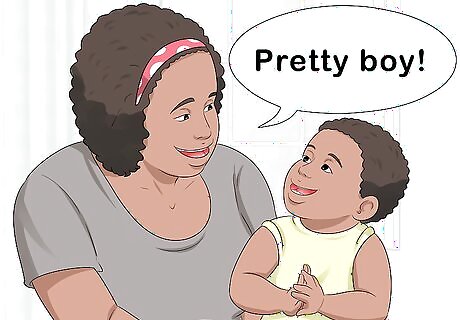
Talk to your baby. It can be tempting to coo back at your baby when they make silly sounds at you. However, it's better to respond with words so your baby starts learning them. When your baby coos, you can say things like, "Pretty boy!" or "Smart girl!" Try using a high pitch voice and make sure to draw out your syllables. It can also help to narrate what you're doing throughout the day, as that encourages your baby to learn more words.
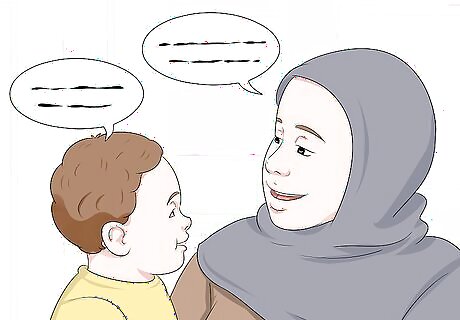
Expand your sentences. The more words you speak to your baby, the more they take in over time. That is, if you only use short sentences like "Stop that!," those words are the only ones your child hears. Instead, try to have continuing conversations with your baby, engaging them as much as you can based on their age. Don't rely on videos to do the speaking for you. Babies learn much better when people speak to them and interact with them in person rather than through a video.

Ask your baby questions. As your baby is getting older, asking them questions can get them thinking about the world. Before babies can speak, they can nod yes or no in response to a question. They can also offer other nonverbal replies. Treat any kind of nonverbal response as a reply, and continue the conversation accordingly.

Read to your baby. Pick age-appropriate books that are bright and colorful, and then sit down and read them with your baby. Also, point at pictures and make appropriate sounds. For instance, make each of the animal sounds you see in a book about animals.
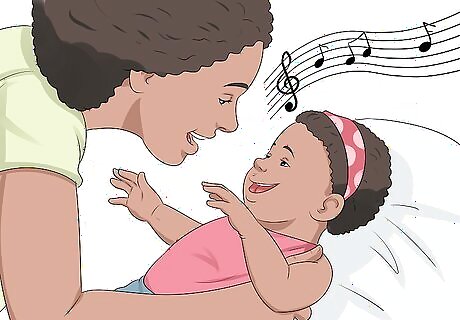
Sing to your baby. Another way you can help develop language is to sing little songs to your baby throughout the day. They don't even need to be "real" songs; they can just be little made-up tunes about what you're doing. Singing helps increase your baby's language skills, as it encourages them to learn new words.
Helping Babies Interact with the World
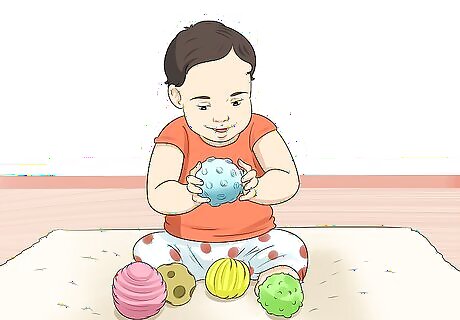
Offer a variety of textures. Let the baby play with toys with a variety of textures. You can also encourage play with a variety of baby-safe objects around the house. Your baby is absorbing information through touch as they play with these items. With this in mind, try to get your baby a little time outdoors every day. Exposing your baby to different sights, sounds, and experiences keeps their brains engaged. Do tummy time a few minutes a day to develop strong neck and back muscles and keep your baby interested in their surroundings.
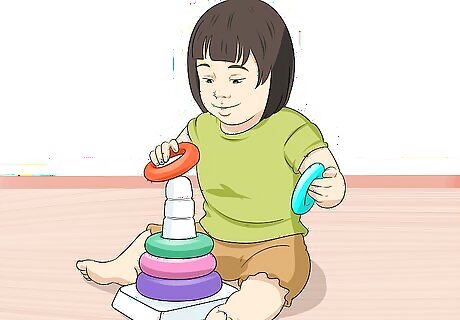
Provide toys that help with motor skills. Babies need to practice their gross (large movement) and fine (small movement) motor skills. Things like blocks and stacking toys help babies work on grasping early on. As your baby gets a little older, balls and straddling toys will help get them moving.
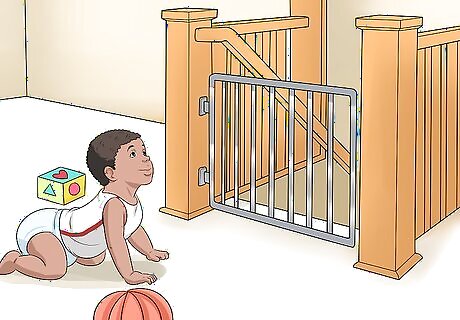
Baby-proof your home. As your baby starts moving and crawling, give them a safe place to explore. Exploring helps them learn about their environment, and it creates the building blocks for spatial intelligence, helpful in things like navigation, mathematics, and sports. Make sure you remove anything the baby could put in their mouth (and choke on) and cover all electrical outlets. Also, remove any kind of chemicals (including household cleaners and even cosmetics) your baby could get into. You can use baby gates to keep them out of areas where they could get into trouble.

Let them get a little messy. Babies love playing around in messy textures, and letting them have some free rein gives them a chance to explore the physics of these objects. Finger paints, mud, sand, and water all make great textures for babies to play in, though of course, you should supervise them closely (or join in the fun yourself!).

Take toys to the bathtub. Bath time is a great time to learn about things like how cups are filled up and how gravity works. That is, you don't have to actively teach these things to your child; just give them toys to play with in the bathtub. With a set of cups, most kids will start pouring water back and forth, for instance, which helps your baby learn about things like volume and gravity.
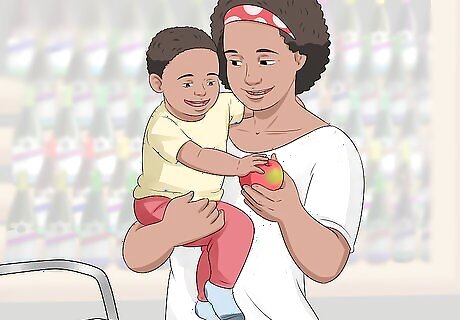
Keep them entertained at the grocery store. Use your grocery store time to engage your baby. As you pick up different fruits, for instance, say their names and let your baby touch them before you place them in your basket. You can also do things like count items as you place them in your cart or say what you're going to do with each thing. Repetition, such as talking about the same fruits every time you go to the grocery store, helps your baby build neurons and create lasting memories.




















Comments
0 comment